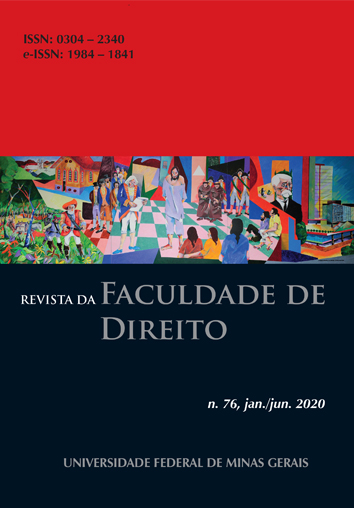INTELIGÊNCIA ARTIFICIAL ENTRE ESTRATÉGIAS NACIONAIS E A CORRIDA REGULATÓRIA GLOBAL: ROTAS ANALÍTICAS PARA UMA RELEITURA INTERNACIONALISTA E COMPARADA - DOI: 10.12818/P.0304-2340.2020v76p229
Resumo
O artigo explora a vertente de formulação de políticas e estratégias nacionais de inteligência artificial (IA) como elementos da corrida regulatória global entre atores estatais e não estatais em torno das interações e transações evolvendo sistemas autônomos e inteligentes. Antes da escolha sobre como regular IA, Estados voltam-se para distintas ações, políticas e programas que influenciam a formação subsequente de consensos e diálogos por organizações internacionais e não-governamentais e aprofundam campos autênticos de escolhas regulatórias. Estratégias nacionais de IA, nesse sentido, são tomadas como exemplos para compreensão das dinâmicas preparatórias dos processos legais transacionais, fertilização cruzada entre regimes domésticos e alocação da jurisdição, especialmente a prescritiva, com discussões a respeito da determinação dos modelos a regular sistemas autônomos e inteligentes nos níveis doméstico, regional e global.
Referências
BARFIELD, Woodrow; PAGALLO, Ugo (Ed.). Research Handbook on the Law of Artificial Intelligence. Chetelham: Edward Elgar Publishing, 2018.
BELL, Daniel. The Coming of Post Industrial Society: A Venture in Social Forecasting. New York: Basic Books, 1976.
BOSTROM, Nick; YUDKOWSKY, Eliezer. The ethics of artificial intelligence. In: The Cambridge Handbook of Artificial Intelligence, v. 1, 2014, p. 316-334.
BUNZ, Mercedes; JANCIUTE, Laima. Artificial Intelligence and the Internet of Things. Communication and Media Research Institute: University of Westminster, 2018.
CUSSINS, Jessica. National and International AI Strategies. Future of Life Institute. 2019. Disponível em: <https://futureoflife.org/national-international-ai-strategies/>. Acesso em 30 de janeiro de 2019.
DING, Jeffrey. ‘How China Seeks to Govern AI’. Medium. September 5, 2018. Disponível em <https://medium.com/@ChallengesFnd/how-china-seeks-to-govern-ai-baf1c0cd1a54>. Acesso em: 30 de janeiro de 2019.
DUTTON, Tim. An Overview of National AI Strategies. Medium. June 28, 2018. Disponível em: <https://medium.com/politics-ai/an-overview-of-national-ai-strategies-2a70ec6edfd>.
Acesso em 30 de janeiro de 2019.
GOEL, Ashok K., e DAVIES, Jim. Artificial Intelligence. In: STERNBERG, Robert J.; KAUFMAN, Scott (ed.). The Cambridge handbook of intelligence. Cambridge: Cambridge Univ. Press, 2011.p. 468–82.
HATMAKER, Taylor. Saudi Arabia bestows citizenship on a robot named Sophia. 28 October, 2018. Disponível em: <https://techcrunch.com/2017/10/26/saudi-arabia-robot-citizen-sophia/?guccounter=1>. Acesso: 30 de janeiro de 2019.
HOUSE OF LORDS, AI in the UK: ready, willing and able? Select Committee on Artificial Intelligence Report of Session 2017–19 HL Paper 100, p.1-183. (“Relatório do Parlamento”). Disponível em: <https://publications.parliament.uk/pa/ld201719/ldselect/ldai/100/100.pdf#page=93> .Acesso em 30 de janeiro de 2019.
KHAKUREL, Jayden et.alli. The rise of Artificial Intelligence under the lens of sustainability. In: Technologies, vol.6, n.4, 2018, p. 100-21.
NITI Aayog, National Strategy for Artificial Intelligence. Paper. June 2018. Disponível em: . Acesso em 30 de janeiro de 2018.
POLIDO, Fabrício B. P. Direito Internacional Privado nas Fronteiras do Trabalho e da Tecnologias: ensaios e narrativas na era digital. 1ª ed. Rio de Janeiro: Lumen Iuris, 2019.
POLIDO, Fabricio B.P. Novas perspectivas para regulação da Inteligência Artificial: diálogos entre as políticas domésticas e os processos legais transnacionais. In: FRAZÃO, Ana; e
MULHOLLAND, Caitlin (org). Inteligência Artificial e Direito: Ética, Regulação e Responsabilidade. São Paulo: Thomson Reuters, 2019, p.87-103.
POLIDO, Fabrício B.P. Jurisdiction, international legal cooperation and cross-border internet disputes in Brazil: tortious replies but renewed expectations to private international law. In: Yearbook of Private International Law, Vol. XX, 2018/2019.
RIBEIRO, Marilda R. et al (org.) Governança Global. Vol. 1. Belo Horizonte: Arraes, 2018.
SARAN, Samir, NATARAJAN, Nikhila e SRIKUMAR, Madhulika. In Pursuit of Autonomy: AI and National Strategies. Observer Research Foundation. 2018. Disponível em: <https://www.orfonline.org/wp-content/uploads/2018/11/Ai_Book.pdf>.
SARTOR, Giovanni. Intelligenza artificiale e diritto: un'introduzione. Giuffrè: Milano, 1996
SARTOR, Giovanni. L’intenzionalita dei sistemi informatici e il diritto. In: Rivista trimestrale di diritto e procedura civile, vol. 57, 2003, p. 23-37.
SCHANK, Roger.; e TOWLE. Brendon Artificial Intelligence. In: STERNBERG Robert (ed.) Handbook of Intelligence. Cambridge: Cambridge Univ. Press. 2000, p. 341-56.
STARK Luke e PYLYSHYN, Zenon W. Artificial Intelligence (AI). In The Canadian Encyclopedia, Historica Canada. 2018. Disponível em <https://www.thecanadianencyclopedia.ca/en/article/artificial-intelligence>.
SUSSKIND, Richard E. Expert systems in law: A jurisprudential approach to artificial intelligence and legal reasoning. The modern law review, v. 49, n. 2, 1968, p.168-194
UNESCO, Towards a monopolization of research in artificial intelligence? Natural Sciences Sector. 20 de julho de 2018. Disponível em: . Acesso em 31 de janeiro de 2019.
UNITED STATES OF AMERICA, Summary of the 2018 White House Summit on Artificial Intelligence for American Industry. Product of the White House Office of Science And Technology Policy. May 10, 2018. Disponível em:<https://www.epic.org/SelectCommitteeonAI.pdf> e <https://www.whitehouse.gov/wp-content/uploads/2018/05/Summary-Report-of-White-House-AI-Summit.pdf>. Acesso em 30 de janeiro de 2019.
WINEGAR, Andrew. Protecting “The Next Rembrandt” Evaluating Artificial Intelligence’s Relationship with Copyright Law. Chicago-Kent Journal of Intellectual Property Blog. January 26, 2018.
WIPO, Technology Trends 2019 – Artificial Intelligence. Geneva: World Intellectual Property Organization, 2019. Disponível em: <https://www.wipo.int/publications/en/details.jsp?id=4386>. Acesso em 31 de janeiro de 2019.



